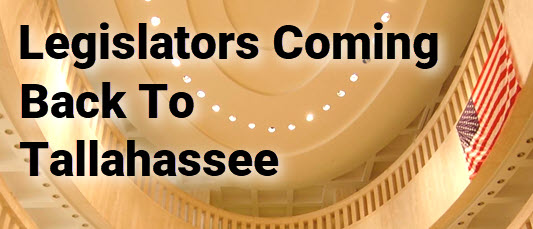Florida Lawmakers Must Return to Tallahassee to Adopt $92.3 Billion Budget
Posted March 17, 2020 05:15 am

Observer Graphic
| Photo by THOR
TALLAHASSEE, FL – Florida lawmakers will assemble at noon Thursday to approve a $93.2 billion fiscal year 2021 budget that likely will be redrafted in less than three months.
The House and Senate will convene to cast votes on three bills – the General Appropriations Act, House Bill 5001; its implementation bill, House Bill 5003; and a collective bargaining agreement, House Bill 5005 – 72 hours after they advanced them Sunday night.
The budget sets aside at least $300 million for coronavirus response and boosts state reserves above $3.8 billion in what can best be described as a wait-and-see plan. Lawmakers are likely to meet in a special session before the fiscal year begins July 1 to make adjustments as circumstances dictate.
Questioning the Wisdom
Many lawmakers are questioning the wisdom of returning to Tallahassee after from spending five days in districts to cast three quick votes, especially with the federal Centers for Disease & Prevention Control suggesting all gatherings of more 50 people be canceled.
With 160 legislators and a skeletal staff and media presence, at least 200 people will be gathering in one place after spending five days scattered across the state.
“The notion of coming back here in a few days, after all of our members have had the opportunity to return home and do their jobs and mingle as best they can with their constituents and come back into what could be a large petri dish by then, is personally extremely daunting to me as we are moving into what may be the height of this crisis," Rep. Joe Geller, D-Dania Beach, said Friday.
“It’s the stupidest damn thing I’ve ever heard,” Rep. Evan Jenne, D-Hollywood, said.
The state’s constitution, however, doesn’t allow for remote voting.
While virtually every state uses technology to enhance public input, only Oregon and Wisconsin have statutes that direct that same technology to allow state lawmakers to attend and vote in emergency electronic meetings, according to the National Conference of State Legislatures (NCSL).
Colorado law allows its Legislature to use “new or streamlined methods of operations” and suspend rules to “function effectively during the disaster emergency,” the NCSL reports.
"You Must Be Present"
Otherwise, state Legislatures, including Florida, operate under a “you must be present” rule, which means lawmakers must be publicly witnessed in committee or on chamber floors to debate and vote.
Florida Senate President Bill Galvano, R-Bradenton, told senators in a Sunday email that the coronavirus emergency could be an opportunity to update the state’s statutes to include provisions for emergency continuance-of-governance remote voting, although it may be too late for the budget vote.
“I am not willing to risk a legal challenge that could prevent our budget from being promptly enacted,” Galvano wrote. “We will take significant precautions to mitigate the risks associated with group gatherings.”
He said staffing “will be minimal and limited to those staff specifically designated” to be there. Public galleries will be closed.
“Senators who are showing any symptoms and those with underlying health conditions should contact the chief of staff regarding a requested absence,” Galvano said.
Public Seating Galleries Closed
The House also will close its public seating galleries and excuse “any member from attendance who has symptoms associated with the virus or who meets the criteria for being part of the higher risk population,” according to a Sunday memo from Speaker Jose Oliva, R-Hialeah.
As of Friday, NCSL reported 11 Legislatures – Colorado, Connecticut, Delaware, Georgia, Illinois, Kentucky, Maine, Nebraska, New Hampshire, Rhode Island and Vermont – have postponed their legislative session until at least mid-April. The Missouri Senate and Ohio House also have postponed sessions.
-------------------------------
This piece appeared in the The Center Square and was reprinted by the Columbia County Observer with permission or license.
Layout and graphics added by the Observer

 By
John Haughey | The Center Square
By
John Haughey | The Center Square